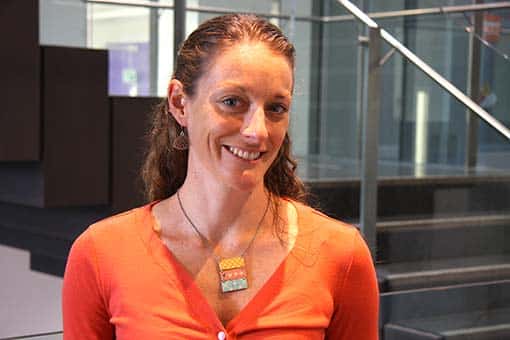
An HMRI trial of an intensive smoking intervention for pregnant Aboriginal and Torres Strait Islander women has won the prestigious ‘Prize for Excellence in Medical Research’ for the best research paper published in the Medical Journal of Australia during the past year.

Dr Conor Giligan’s smoking intervention for pregnant Aboriginal women has won an MJA prize.
An HMRI trial of an intensive smoking intervention for pregnant Aboriginal and Torres Strait Islander women has won the prestigious ‘Prize for Excellence in Medical Research’ for the best research paper published in the Medical Journal of Australia during the past year.
The winning paper resulted from an NHMRC-funded project by a University of Newcastle research team and health practitioners. Dr Conor Gilligan, who relocated to Cairns and Townsville for 18 months, worked closely with the Aboriginal community-controlled health services to establish the project as part of her PhD research.
Fellow University researchers Professor Sandra Eades, Laureate Professor Rob Sanson-Fisher AO, Professor Catherine D’Este and Jessica Stewart were lead researchers in the study, along with Queensland-based medical officers Mark Wenitong and Katie Panaretto.
“Smoking is a major issue among Aboriginal communities in these regions, with rates over twice that of the mainstream population,” Dr Gilligan said. “It’s approximately where Australia’s smoking levels were 20 to 30 years ago.
“We found that while pregnant woman have a reasonable knowledge of the risks of smoking the social influence is very strong. It’s part of their social fabric because they live and interact with so many other adults who smoke.”
In the trial – the first of its kind – 263 women attending their first antenatal visit at one of three Aboriginal health services were randomly allocated to two pathways.
The intervention group received tailored advice and social support, along with nicotine replacement therapy if required, to help quit smoking. The control group received standard advice and support from the GP at their scheduled antenatal visits.
Smoking rates remained high at 36 weeks of pregnancy, with 89 per cent in the intervention group and 95 per cent in the control group … a difference that was not considered statistically significant.
“It may sound strange that the study can still win a major prize but importantly it recognises the challenges of doing this kind of work,” Dr Gilligan said. “We didn’t expect it to be a magic bullet.
“Smoking during pregnancy brings an elevated risk of low birth weight, which carries with it potential developmental problems and illnesses that extend into adulthood, so it’s very important to raise awareness about smoking cessation.”
Judges from the MJA’s Content Review Committee said they recognised that the research, conducted in a difficult real-world setting, contributed to the endeavour of improving the health of Aboriginal and Torres Strait Islander women and their children.
The cash prize of $10,000 is being presented on Saturday, May 25, during the 2013 AMA National Conference.
* Dr Conor Gilligan is a Senior Lecturer with the University of Newcastle’s Faculty of Health and researches in conjunction with HMRI’s Public Health Program. HMRI is a partnership between the University of Newcastle, Hunter New England Health and the community.
HMRI would like to acknowledge the Traditional Custodians of the land on which we work and live, the Awabakal and Worimi peoples, and pay our respects to Elders past and present. We recognise and respect their cultural heritage and beliefs and their continued connection to their land.

Hunter Medical Research Institute
We’re taking healthy further.
Locked Bag 1000
New Lambton
NSW, Australia, 2305



This site is protected by reCAPTCHA and the Google Privacy Policy and Terms of Service apply.
Copyright © 2024 Hunter Medical Research Institute | ABN: 27 081 436 919
Site by Marlin Communications
